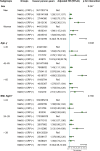The combination of metabolic syndrome and inflammation increased the risk of colorectal cancer
- PMID: 35715516
- PMCID: PMC9307555
- DOI: 10.1007/s00011-022-01597-9
The combination of metabolic syndrome and inflammation increased the risk of colorectal cancer
Abstract
Background: Inflammation and metabolic syndrome (MetS) may act synergistically and possibly accelerate the initiation and progression of colorectal cancer (CRC). We prospectively examined the joint effect of MetS and inflammation on the risk of CRC.
Methods: We studied 92,770 individuals from the Kailuan study. MetS was defined based on the presence of three or more of the following components. (1) high glucose: FPG > 5.6 mmol/L; (2) high blood pressure: SBP ≥ 130 mmHg or DBP ≥ 85 mmHg; (3) high triglycerides: triglycerides > 1.69 mmol/L; (4) low HDL-C: HDL-C < 1.04 mmol/L in men or 1.29 mmol/L in women; and (5) visceral adiposity: waist circumference ≥ 85 cm in men or 80 cm in women. Inflammation was defined as hs-CRP ≥ 3 mg/L. We divided participants into four groups for the primary exposure according to the presence/absence of inflammation and presence/absence of MetS. Cox proportional hazards regression models were used to evaluate the association of MetS and/or inflammation with the risk of CRC.
Results: Compared with metabolically healthy noninflammatory individuals, inflammatory participants without MetS and inflammatory participants with MetS were associated with a 1.3-fold and 4.18-fold increased risk of CRC with corresponding HRs (95% CI) of 1.34 (1.09, 1.64) and 4.18 (3.11, 5.62), respectively. The combination of MetS and inflammation was associated with the highest risk of CRC in all subgroups, especially among participants who were female, in younger age, and obese. Sensitivity analyses further validated our primary findings.
Conclusions: We found the combination of MetS and inflammation could significantly increase the risk of CRC. Including CRP in the diagnosis of MetS may help to identify additional high-risk participants who should be targeted for early diagnosis and prevention of CRC. Trial registration Kailuan study, ChiCTR-TNRC-11001489. Registered 24 August, 2011-Retrospectively registered, http:// www.chictr.org.cn/showprojen.aspx?proj=8050.
Keywords: Colorectal cancer; Inflammation; Joint-effect; Metabolic syndrome.
© 2022. The Author(s).
Conflict of interest statement
The authors declare no competing interests.
All the authors have declared there was none conflict of interest.
Figures
Similar articles
-
Metabolic syndrome, high-sensitivity C-reactive protein and the risk of heart failure: the Kailuan cohort study.Front Endocrinol (Lausanne). 2025 Apr 22;16:1544823. doi: 10.3389/fendo.2025.1544823. eCollection 2025. Front Endocrinol (Lausanne). 2025. PMID: 40331143 Free PMC article.
-
Association between metabolic syndrome, C-reactive protein, and the risk of primary liver cancer: a large prospective study.BMC Cancer. 2022 Aug 4;22(1):853. doi: 10.1186/s12885-022-09939-w. BMC Cancer. 2022. PMID: 35927639 Free PMC article.
-
Associations between hepatitis B virus infection and risk of colorectal Cancer: a population-based prospective study.BMC Cancer. 2021 Oct 18;21(1):1119. doi: 10.1186/s12885-021-08846-w. BMC Cancer. 2021. PMID: 34663268 Free PMC article.
-
The impact of Ramadan fasting on the metabolic syndrome severity in relation to ethnicity and sex: Results of a systematic review and meta-analysis.Nutr Metab Cardiovasc Dis. 2022 Dec;32(12):2714-2729. doi: 10.1016/j.numecd.2022.09.001. Epub 2022 Sep 12. Nutr Metab Cardiovasc Dis. 2022. PMID: 36333203
-
Effect of vegetarian diets on the presentation of metabolic syndrome or its components: A systematic review and meta-analysis.Clin Nutr. 2019 Jun;38(3):1117-1132. doi: 10.1016/j.clnu.2018.05.021. Epub 2018 Jun 6. Clin Nutr. 2019. PMID: 29907356
Cited by
-
Metabolic syndrome, high-sensitivity C-reactive protein and the risk of heart failure: the Kailuan cohort study.Front Endocrinol (Lausanne). 2025 Apr 22;16:1544823. doi: 10.3389/fendo.2025.1544823. eCollection 2025. Front Endocrinol (Lausanne). 2025. PMID: 40331143 Free PMC article.
-
The association of life's essential 8 scores trajectory patterns with the risk of all cancer types.Sci Rep. 2025 Mar 20;15(1):9600. doi: 10.1038/s41598-025-94009-x. Sci Rep. 2025. PMID: 40113959 Free PMC article.
-
Metabolic Phenotype and Risk of Obesity-Related Cancers in the Women's Health Initiative.Cancer Prev Res (Phila). 2025 Feb 3;18(2):63-72. doi: 10.1158/1940-6207.CAPR-24-0082. Cancer Prev Res (Phila). 2025. PMID: 39540294 Free PMC article.
-
Early-onset and later-onset cancer: trends, risk factors, and prevention in Northern China.Sci China Life Sci. 2024 Sep;67(9):1928-1940. doi: 10.1007/s11427-023-2523-5. Epub 2024 May 23. Sci China Life Sci. 2024. PMID: 38809499
-
Novel metabolic prognostic score for predicting survival in patients with cancer.Sci Rep. 2025 Jan 8;15(1):1322. doi: 10.1038/s41598-025-85287-6. Sci Rep. 2025. PMID: 39779840 Free PMC article.
References
-
- Kushi LH, Doyle C, McCullough M, Rock CL, Demark-Wahnefried W, Bandera EV, et al. American cancer society guidelines on nutrition and physical activity for cancer prevention: reducing the risk of cancer with healthy food choices and physical activity. CA Cancer J Clin. 2012;62(1):30–67. doi: 10.3322/caac.20140. - DOI - PubMed
MeSH terms
Substances
Grants and funding
LinkOut - more resources
Full Text Sources
Medical
Research Materials
Miscellaneous




